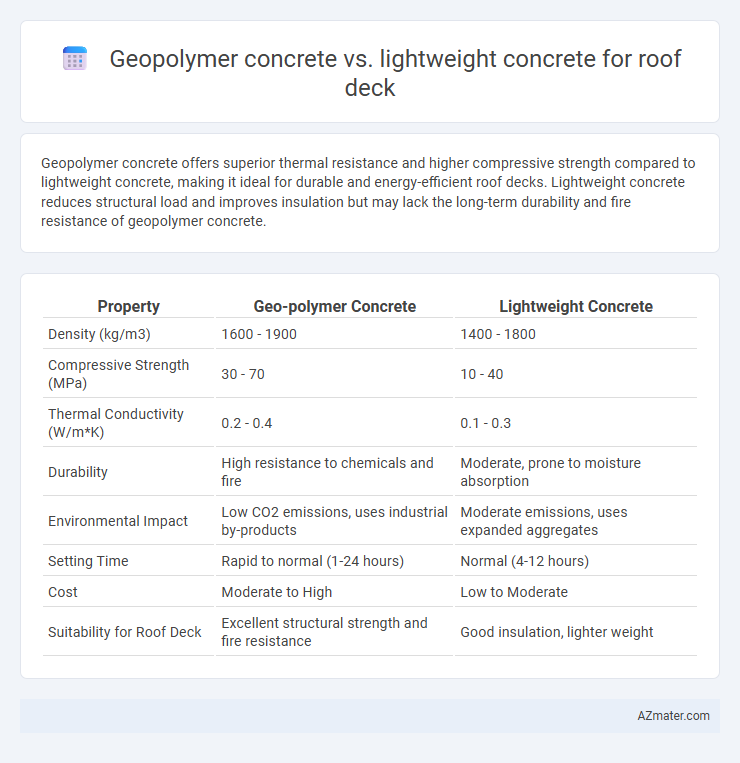Geopolymer concrete offers superior thermal resistance and higher compressive strength compared to lightweight concrete, making it ideal for durable and energy-efficient roof decks. Lightweight concrete reduces structural load and improves insulation but may lack the long-term durability and fire resistance of geopolymer concrete.
Table of Comparison
| Property | Geo-polymer Concrete | Lightweight Concrete |
|---|---|---|
| Density (kg/m3) | 1600 - 1900 | 1400 - 1800 |
| Compressive Strength (MPa) | 30 - 70 | 10 - 40 |
| Thermal Conductivity (W/m*K) | 0.2 - 0.4 | 0.1 - 0.3 |
| Durability | High resistance to chemicals and fire | Moderate, prone to moisture absorption |
| Environmental Impact | Low CO2 emissions, uses industrial by-products | Moderate emissions, uses expanded aggregates |
| Setting Time | Rapid to normal (1-24 hours) | Normal (4-12 hours) |
| Cost | Moderate to High | Low to Moderate |
| Suitability for Roof Deck | Excellent structural strength and fire resistance | Good insulation, lighter weight |
Introduction to Geo-polymer and Lightweight Concrete
Geo-polymer concrete, composed of aluminosilicate materials activated by alkaline solutions, offers superior durability, chemical resistance, and low carbon footprint, making it an innovative alternative for roof decks in sustainable construction. Lightweight concrete incorporates low-density aggregates such as expanded clay or shale, providing reduced structural load and enhanced thermal insulation, which is crucial for roofing applications. Both materials present unique advantages, with geo-polymer concrete emphasizing environmental benefits and strength, while lightweight concrete focuses on weight reduction and energy efficiency.
Composition and Material Properties
Geopolymer concrete for roof decks consists primarily of industrial byproducts like fly ash or slag activated with alkaline solutions, resulting in a material with high compressive strength, excellent thermal resistance, and superior durability against chemical attacks. Lightweight concrete incorporates lightweight aggregates such as expanded clay, shale, or pumice, reducing density while maintaining moderate strength and improved thermal insulation properties. The distinct compositions influence their material properties: geopolymer concrete offers enhanced fire resistance and environmental benefits, whereas lightweight concrete provides better thermal insulation and reduced structural load.
Weight and Structural Load Comparison
Geo-polymer concrete typically exhibits higher density, ranging from 2200 to 2500 kg/m3, compared to lightweight concrete, which weighs between 1400 and 1800 kg/m3, significantly reducing roof deck self-weight. This reduction in weight decreases structural load demands on supporting elements, allowing for slimmer beams and foundations while enhancing overall seismic performance. Consequently, lightweight concrete offers superior advantages in minimizing dead loads, whereas geo-polymer concrete provides enhanced durability and fire resistance without considerably increasing weight.
Thermal Insulation Performance
Geo-polymer concrete exhibits superior thermal insulation performance for roof decks due to its low thermal conductivity and high fire resistance, which reduces heat transfer and enhances energy efficiency. Lightweight concrete, while offering good insulation properties from its air-entrained structure, generally has higher thermal conductivity compared to geo-polymer alternatives. The dense microstructure of geo-polymer concrete provides better long-term thermal stability and durability under varying weather conditions than lightweight concrete.
Durability and Longevity Factors
Geo-polymer concrete offers superior durability and longevity for roof decks due to its high resistance to chemical attacks, fire, and extreme weather conditions, outperforming traditional lightweight concrete. Lightweight concrete, while advantageous for reducing structural load and improving thermal insulation, is more susceptible to shrinkage, cracking, and moisture ingress, which can compromise long-term performance. Selecting geo-polymer concrete enhances the lifespan and structural integrity of roof decks in harsh environments, making it a more sustainable choice for durability-demanding applications.
Environmental Impact and Sustainability
Geo-polymer concrete significantly reduces carbon emissions by utilizing industrial by-products like fly ash and slag, making it a more sustainable option compared to traditional lightweight concrete, which relies on energy-intensive materials. The production of geo-polymer concrete minimizes the depletion of natural resources and lowers greenhouse gas emissions, thereby reducing the overall environmental impact of roof deck construction. Lightweight concrete, while offering thermal insulation benefits, generally involves higher embodied energy due to its cement content, making geo-polymer concrete a superior choice for eco-friendly and sustainable building practices.
Construction and Installation Methods
Geo-polymer concrete for roof decks utilizes industrial by-products like fly ash and slag, requiring controlled mixing with alkaline activators and curing at ambient or elevated temperatures to achieve high early strength. Lightweight concrete involves incorporating lightweight aggregates such as expanded clay, perlite, or foam, which necessitate precise water-cement ratios and careful handling to maintain workability and prevent segregation during placement. Installation of geo-polymer concrete demands specialized knowledge of chemical activators and curing conditions, while lightweight concrete installation follows conventional casting and finishing techniques with added attention to aggregate distribution to ensure uniform insulation and structural performance.
Cost Analysis and Economic Considerations
Geo-polymer concrete offers significant cost savings for roof decks due to its utilization of industrial by-products like fly ash, reducing material expenses compared to traditional lightweight concrete. Lightweight concrete, while providing excellent thermal insulation and reduced structural load, often incurs higher costs because of specialized aggregates and additives. Evaluating long-term economic benefits involves considering durability, maintenance expenses, and environmental impact, where geo-polymer concrete demonstrates superior performance and lower lifecycle costs.
Suitability for Roof Deck Applications
Geopolymer concrete offers enhanced durability, fire resistance, and environmental benefits, making it highly suitable for roof deck applications where long-term performance is critical. Lightweight concrete provides excellent thermal insulation and reduces structural load, which is advantageous for roof decks requiring weight savings and energy efficiency. Selection depends on specific project demands, balancing structural strength with insulation and sustainability criteria.
Conclusion: Selecting the Optimal Concrete Type for Roof Decks
Geo-polymer concrete offers superior durability, chemical resistance, and environmental benefits due to its low carbon footprint, making it highly suitable for roof decks exposed to harsh conditions. Lightweight concrete provides excellent thermal insulation and reduces structural load, which is advantageous for long-span roof decks and seismic resistance. Selecting the optimal concrete depends on project priorities: prioritize geo-polymer concrete for sustainability and durability while choosing lightweight concrete for improved insulation and reduced structural weight.

Infographic: Geo-polymer concrete vs Lightweight concrete for Roof deck
 azmater.com
azmater.com